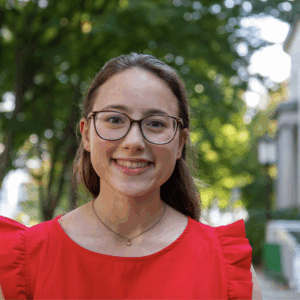
Sophie M. Thompson
MIT HEALS | MIT Health and Life Sciences Collaborative Undergraduate Research and Innovation Scholar
Optimization of Natural Fiber Prosthetic Socket Manufacturing Method for Sierra Leone
2025–2026
Chemical Engineering
- Chemical Engineering
- Health and Life Sciences
Herr, Hugh M.
Less than 10% of patients globally have access to orthotic and prosthetic medical care, and thus have barriers to managing the effects of their disability and to maximizing their mobility. For prosthesis users, the prosthetic socket, the interface between the residual and prosthetic limb, is the most critical component of the device to maintain. The socket requires frequent adjustments and replacement to ensure the health of the residual limb and painless ambulation. Sockets are typically made from carbon-fiber mesh, supported by acrylic resins. Acquiring materials to fabricate carbon-fiber sockets— “the gold standard of care“—is logistically difficult and prohibitively expensive in locations like Sierra Leone, West Africa. Research studies by Nigerian scientists proved the feasibility of using natural fibers from locally-grown plants, like banana trees, as carbon-fiber alternatives to produce natural fiber prosthetic sockets for use in similar environments. However, data on clinical safety of these sockets and guides informing fabrication processes for clinicians are limited. Therefore, this project aims to optimize a step-by-step manufacturing method for fabricating natural fiber sockets including material testing, fabrication, and mechanical testing at MIT, in a simulated tropical environment, and in Sierra Leone, followed by clinical trials. Chemical and manual extraction methods were tested, with a combination of water retting and 5% NaOH solution providing the optimal result. Mechanical testing has ensured that the natural fibers equate to carbon fiber in terms of characteristics like tensile strength and bendability. The preliminary results are promising and indicate the potential for adoption in numerous limited resource environments, thus improving the prosthetic management of care post-amputation and enabling mobility for patients who benefit from this innovation.
I joined SuperUROP because I wanted to gain more experience translating my research out of the lab into a presentation setting. I look forward to the different workshops and exercises in SuperUROP that I will be able to apply back to my research.
